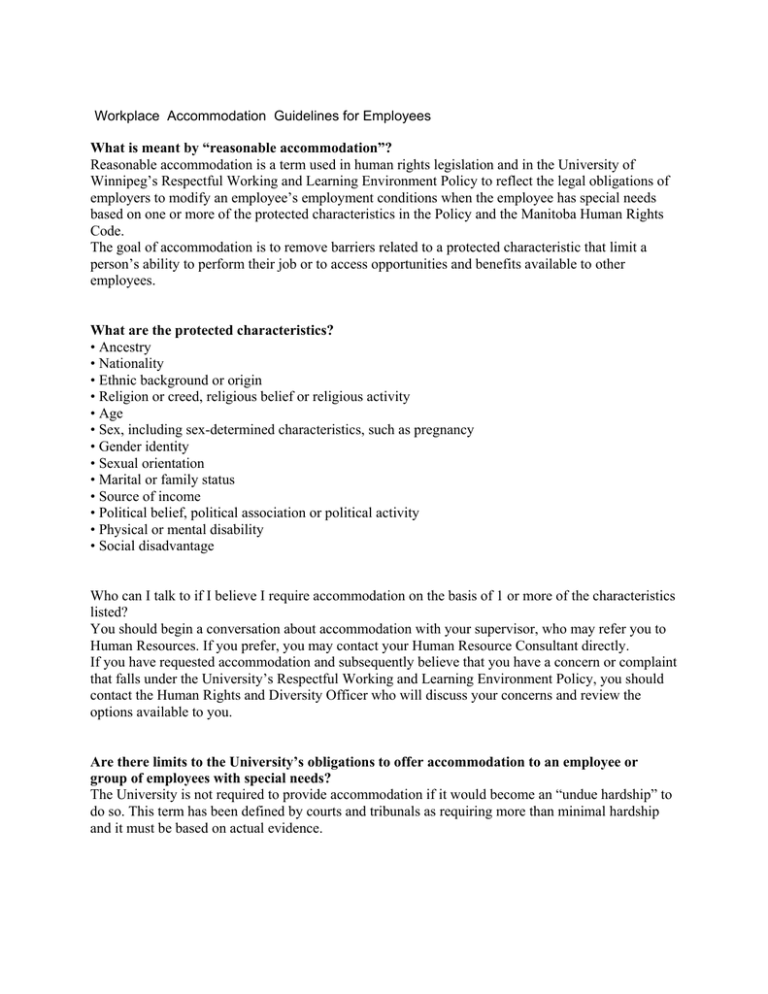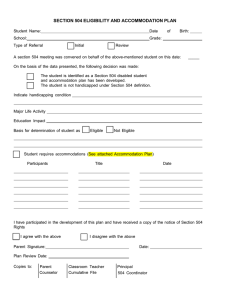What is meant by “reasonable accommodation”? Reasonable
advertisement

Workplace Accommodation Guidelines for Employees What is meant by “reasonable accommodation”? Reasonable accommodation is a term used in human rights legislation and in the University of Winnipeg’s Respectful Working and Learning Environment Policy to reflect the legal obligations of employers to modify an employee’s employment conditions when the employee has special needs based on one or more of the protected characteristics in the Policy and the Manitoba Human Rights Code. The goal of accommodation is to remove barriers related to a protected characteristic that limit a person’s ability to perform their job or to access opportunities and benefits available to other employees. What are the protected characteristics? • Ancestry • Nationality • Ethnic background or origin • Religion or creed, religious belief or religious activity • Age • Sex, including sex-determined characteristics, such as pregnancy • Gender identity • Sexual orientation • Marital or family status • Source of income • Political belief, political association or political activity • Physical or mental disability • Social disadvantage Who can I talk to if I believe I require accommodation on the basis of 1 or more of the characteristics listed? You should begin a conversation about accommodation with your supervisor, who may refer you to Human Resources. If you prefer, you may contact your Human Resource Consultant directly. If you have requested accommodation and subsequently believe that you have a concern or complaint that falls under the University’s Respectful Working and Learning Environment Policy, you should contact the Human Rights and Diversity Officer who will discuss your concerns and review the options available to you. Are there limits to the University’s obligations to offer accommodation to an employee or group of employees with special needs? The University is not required to provide accommodation if it would become an “undue hardship” to do so. This term has been defined by courts and tribunals as requiring more than minimal hardship and it must be based on actual evidence. “Undue Hardship” Factors which establish an undue hardship include, but are not limited to: financial costs, health and safety risks to self and others, legitimate operational requirements, impact on employees and service users, disruption to collective agreements, nature of the business, size and scope of the employer’s resources, interchangeability of workforce and facilities, and business efficiency. The context of each situation will be important in assessing whether an undue hardship has been established. The University will consider all reasonable options in the process of assessing accommodation requests. When accommodation is offered, it need not be ideal, but it must be reasonable in the circumstances. (www.uwinnipeg.ca/respect) University’s Workplace Accommodation Policy What are the Employer’s Responsibilities? The employer should: • Determine if the request for accommodation is based on a protected characteristic. • Review supporting medical or other information and determine if clarification or further support for request is necessary. • Listen to and consider the needs of the employee seeking accommodation and their suggestions for accommodation. • Document the request for accommodation and the process of assessing the request and communications with employee. • Obtain consent from the employee to request further relevant medical or other information if required. • Determine to what extent the employee can perform existing job duties and identify essential duties that fall within employee’s restrictions. • Consider modifications to existing job duties including “re-bundling” duties, or other positions. • Share information that is being considered with the employee to seek their input, keeping the employee reasonably updated as to the accommodation process. • Communicate in writing the details of the accommodation plan including the arrangement for follow-up. • Monitor the accommodation plan. • Modify the plan if circumstances or needs change; including if the accommodation is no longer required. Responsibilities of the Employee: Those seeking an individual accommodation have roles and responsibilities to play in the process: • Employees should advise their Supervisor of their need for an accommodation in a timely manner. (In some limited circumstances such as where mental health issues have arisen, the employer may have an obligation to make inquiries without the employee having requested accommodation.) • The request for accommodation must be based on evidence explaining the impact of a disability or other protected characteristic on the employee’s ability to perform his/her regular duties. • Make suggestions for solutions (such as: a specific adaptive software or hardware device) • Co-operate with the employer by providing relevant information to assist in the assessment of the accommodation request and to assist in providing reasonable suggestions as to measures that would meet the accommodation needs. • Perform the requirements as outlined in the accommodation plan and provide feedback to the University as to how the plan is being fulfilled. • Employees seeking accommodation are required to participate and cooperate in accommodation efforts on an ongoing basis including communicating with the University if modifications to the accommodation plan are required or if accommodation is no longer required. • Employees must be prepared to accept reasonable solutions. What are the Responsibilities of Unions? A union’s participation in the accommodation process can include: • Helping to educate members about accommodation. • Encouraging members to identify and communicate the need for an accommodation. • Working with the parties to explore and implement reasonable accommodations. • Supporting individual accommodations on an on-going basis. • Helping to maintain the integrity of the principles of the accommodation process. What are some examples of reasonable accommodation that may be offered to employees, volunteers and potential employees in a University setting? Please note that these are hypothetical examples meant to illustrate possible situations at a University. 1)An employee who is diabetic advises her manager that she cannot take her lunch and coffee break at the scheduled times because her doctor has recommended that she snack frequently throughout the day. She provides a doctor’s note and the necessary schedule changes are made. 2) Tiles are being replaced in an older section of the University. Although barriers have been placed between the area under renovation and the library, an employee in the library contends that she is having an allergic reaction to the fumes. She gives her manager a note from her allergist, and is permitted to work from home until the renovations have been completed. These examples illustrate accommodations which have been provided to employees on the basis of their physical disabilities. 3) A member of the security staff is scheduled to work a shift on the weekend which falls on his religious holiday. The supervisor of the department arranges for a shift change so that the employee will work an extra shift during the week instead of on the weekend. This example illustrates the duty which an employer has to make all reasonable efforts to accommodate an employee’s sincerely held religious beliefs or practices. 4) A faculty member is a single father. He has a daughter with a learning disability who attends a special program during the day. The faculty member’s teaching schedule has changed this term so that he will be unable to pick his daughter up and he has not been able to make alternative arrangements. He discusses his situation with the Dean and his teaching schedule is changed. This accommodation was provided on the basis of family status. In order to trigger the duty to accommodate on the basis of family status, which includes childcare obligations, an employee must demonstrate that the employment requirement interferes with his/her ability to fulfill their substantial parental obligations, and that they have explored reasonable alternative arrangements for child care but none was available. 5) A potential employee has applied for a position within the University and has been invited to attend an interview. The candidate contacts the Human Resources Consultant two weeks before the interview has been scheduled to advise that she has a hearing impairment and communicates using American Sign Language. The consultant arranges for an ASL interpreter at the University’s expense. This example illustrates that an employer’s duty to accommodate extends to potential as well as current employees and that the costs of accommodation should be borne by the employer, unless it would be an undue hardship to do so. 6) A blind faculty member requires the assistance of a service animal. Another member of the same faculty complains to the Dean that he is experiencing a severe allergic reaction to the dog whenever it comes into the Department. He provides a medical note which documents his condition. The Dean asks both faculty members for suggestions as to how their special needs may be accommodated. An agreement is reached that the member with the service dog will relocate his office to another floor. The other faculty member offers to attend faculty meetings by teleconference so that he will not have to be in close proximity to the animal. In this way the special needs of both individuals will be accommodated. This example illustrates the best practice to be followed when there are obligations to accommodate more than 1 group or individual. Employers should make reasonable efforts to attempt to accommodate both rights, to the extent possible. 7) An employee who is undergoing female to male sex reassignment surgery finds it increasingly difficult to find an appropriate washroom. He meets privately with a senior administrator who identifies the locations of the University’s gender neutral washrooms, and provides time for the employee to access the one that they feel most comfortable accessing. This example illustrates how the duty to accommodate is met where the protected characteristic is gender identity. 8) A female employee has just learned that she is pregnant. Her position requires that she be in close proximity to dangerous chemicals. She discusses her concerns with her supervisor who suggests that he will provide a detailed job description to her physician so that they may discuss with and ask for advice from the physician as to which duties she should not be undertaking during her pregnancy. Based on the physician’s response, those duties are assigned to another member of the department and the employee assumes duties outside the lab where there is no risk that she will be exposed to chemicals for the balance of her pregnancy. This example illustrates that an accommodation process may involve altering some of an employee’s duties (i.e. “rebundling” them) in order to meet her special needs. In this case the accommodation will extend until her Maternity Leave begins. 9) A manager becomes concerned because a long term member of her department, who has always been very reserved and quiet, burst into tears for no apparent reason at a staff meeting and began yelling at a colleague in the coffee room. Additional examples of similar behavior during the following week. The manager asked the employee privately if she was experiencing any difficulties with which she required assistance. The employee said that she had been seeing a psychiatrist who had recommended that she take time off to deal with the death of a close family member. The employee said she had declined because it was the busiest time of the year and she was sure that she would be able to "handle things". The manager suggested she consider discussing with her Human Resources Consultant. With the employee's consent, the HR Consultant spoke to the psychiatrist, and it was agreed that the employee would take 2 weeks off and then return to work on a graduated basis. This example illustrates a situation in which an employer has a positive duty to make inquiries to determine whether an employee may require accommodation, based on a possible mental health issue.

